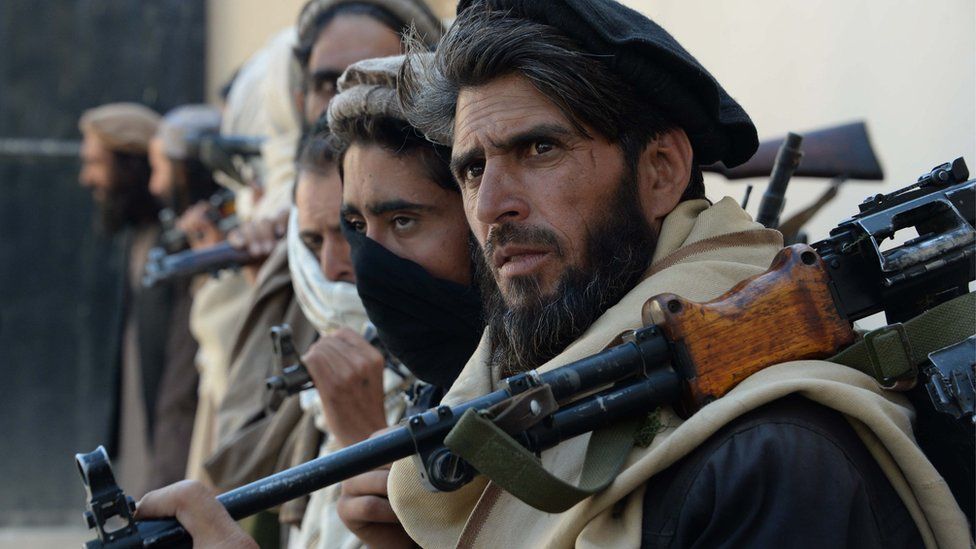Viewpoint: Is there any chance of talks with the Taliban?
- Published

With a new man in charge of the Afghan Taliban, there is now only a limited amount of time for the US, Afghanistan and others to push for peace talks with the movement, argues guest columnist Ahmed Rashid.
The swift election of a new leader of the Taliban came with little controversy surrounding the choice or the manner in which it was carried out - and that bodes well for Mawlawi Hibatullah Akhunzada.
A noted religious figure from Kandahar who has never commanded the Taliban in battle but instead set up a well known madrassa in Kuchlak near Quetta where the Taliban leaders live, he is respected by the many in the movement who see him as honest if not a political heavyweight.
A justice of the Taliban Supreme Court during the 1990s and a close religious adviser to the group's founder Mullah Omar, he has been one of the major figures issuing religious fatwas or edicts governing how the Taliban interpret Sharia or Islamic law - a cornerstone of their ideology and also much of their cruelty towards women and minorities.
No doubt he and his two deputies, Haqqani faction leader Sirajuddin Haqqani and Mullah Mohammad Yakoob, son of Mullah Omar, will continue to pursue the Taliban summer offensive.
There will be no let-up in the fighting for the time being so as to prevent any loss of morale or unity among the rank and file fighters, at the precise moment when US drones and the Afghan armed forces may be hoping for a sudden drop in morale and momentum in the Taliban ranks which they could exploit.
However, more than anything these next few weeks and months offer a space for greater diplomacy. It is time to step up efforts to reach out to the Taliban.
This is the moment when the US and Nato countries, Pakistan and Iran and other regional powers should try to throw everything into establishing contacts with the Taliban and persuade them to enter peace talks with Kabul.
A purposeful diplomatic offensive should be launched by all states involved, in the hope that the Taliban will react positively.
Clearly the four-nation quadrilateral dialogue is now dead, partially buried by Pakistan's unwillingness to put real pressure on the Taliban to enter into constructive peace talks with Kabul, and the military's continuing support for the Taliban leadership.
For example there is still no official comment about how former Taliban leader Mullah Mansour received a Pakistani passport and ID card and how he travelled 18 times to Dubai without a question being asked.
Pakistan's military and Inter-Services Intelligence wasted a year, continuously raising hopes that it would bring the Taliban to the table but in reality achieving nothing and playing a waiting game, while the Taliban went on to notch up more victories in Afghanistan.
However the talks also partly died because the US and Nato countries showed so little interest in the process.
What is needed now is a different kind of diplomacy. Dependence on Pakistan and the US should come to an end. Taliban figures now living outside Pakistan and Afghanistan should be consulted by all involved states, particularly the now large and influential group of Taliban diplomats and commanders gathered in Qatar.
Hibatullah Akhundzada is a religious scholar and he is former head of the Taliban courts
The Qataris and other Arab states should be persuaded to play a more constructive and assertive role in engaging with this group of Taliban or encouraging diplomats from other states to meet them. The Afghan government should also meet these Taliban quietly, too, so that direct meetings between Afghans become the norm rather than a rarity.
The Americans should also establish a team to contact all the Taliban figures it is possible to talk to. Most important is for the US to accept the long-standing Taliban demand of wanting to talk to the Americans before they talk to President Ashraf Ghani. The US and Mr Ghani should agree to this. After all the Americans had begun a process of direct talks with the Qatar Taliban six years ago but it ended acrimoniously.
The Pakistanis should be persuaded by, not just the Americans, but by regional countries that playing a solo game with the Taliban is both dangerous and provocative. The Taliban leaders in Pakistan should be allowed to travel and meet whom they like in the context of a peace plan.
Despite so many failures on the peace front, India and Pakistan must be encouraged to speak to each other on Afghanistan. Pakistan's military is obsessed with India's potential role in Afghanistan and that lack of trust needs to be removed.
At first a diplomatic blitz by all powers may look unplanned, unstructured and meaningless but a dialogue with a proscribed terrorist group can never be easy - as the Northern Ireland talks showed.
A new Taliban leadership which is clearly becoming less dependent on Pakistan needs to be addressed quickly, before once again the space closes and hardliners who want nothing less than total victory come to the fore. It is time for stepped-up diplomacy and reaching out to the Taliban.
Ahmed Rashid
- Ahmed Rashid is a Pakistani journalist and author based in Lahore
- His latest book is Pakistan on the Brink - The Future of America, Pakistan and Afghanistan
- Earlier works include Descent into Chaos and Taliban, first published in 2000, which became a bestseller